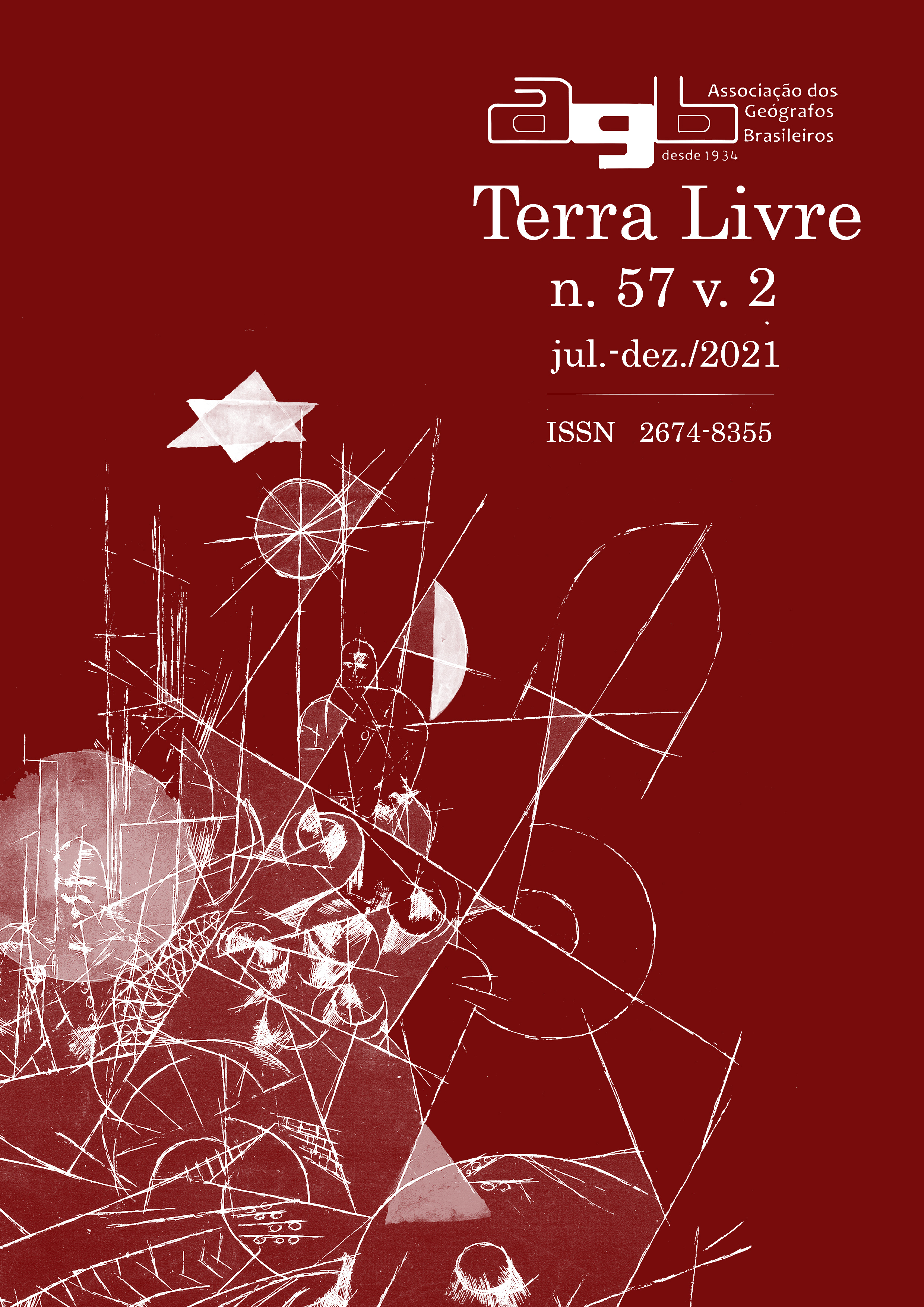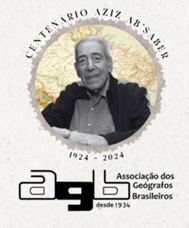Desigualdades regionais e pólos de desenvolvimento
o caso nordestino e o complexo industrial Portuário de Suape
DOI:
https://doi.org/10.62516/terra_livre.2021.2306Palavras-chave:
Desigualdade Regional, Sudeste, Nordeste, Polos de Desenvolvimento.Resumo
A Revolução de 1930 buscou diminuir a dependência brasileira do mercado externo e fomentar a criação de um mercado interno forte. Entretanto, a alta concentração dos investimentos no Sudeste acentuou as desigualdades regionais brasileiras, em especial a do Nordeste. A partir de 1950 essa região se tornou foco de políticas econômicas, incorporando a teoria dos Polos de Desenvolvimento nas estratégias do Estado. Ocorre a implantação, no estado de Pernambuco, do Complexo Industrial e Portuário de Suape, cujas atividades passam a exercer grande influência no desenvolvimento econômico do estado, principalmente nas primeiras décadas do século XXI. Atualmente, se consolida como importante polo industrial com mais de 100 empresas instaladas. Assim sendo, o objetivo deste artigo é investigar as especificidades, causas e consequências que levaram a teoria dos polos de desenvolvimento a ser usada como estratégia para amenizar a disparidade regional do Nordeste frente ao Sudeste, focando, sobretudo, no Complexo Industrial e Portuário de Suape.
Downloads
Referências
AGÊNCIA NACIONAL DE TRANSPORTES AQUAVIÁRIOS (ANTAQ). Análise de Movimentação Portuária Brasileira. 2011. Disponível em: http://www.antaq.gov.br/portal/Anuarios/Anuario2011/Tabelas/AnaliseMovimentacaoPortuaria.pdf. Acesso em: 15 de abr. de 2020.
ALVES, José Luiz. Suape e sua trajetória histórica: um olhar geográfico. 2011. Tese (Doutorado). Programa de Pós-Graduação em Geografia, Universidade Federal de Pernambuco, Recife, 2011. Disponível em: https://repositorio.ufpe.br/handle/123456789/6054. Acesso em: 11 de agosto de 2019.
ANDRADE, Manuel Correia de. Nordeste: alternativas da agricultura. Campinas, SP: Papirus, 1988.
ANDRADE, Manuel Correia de. A questão do território no Brasil. São Paulo-Recife: IPESP/ Hucitec, 1995.
BARROS, J. R. M de; GALVÃO, A. C. A Política de Industrialização do Nordeste em face da Crise Econômica Brasileira. Revista Econômica do Nordeste v.33, n. Especial. Fortaleza, 2002. p. 371-389.
BRASIL. Secretaria de Portos da Presidência da República – SEP/PR. Plano Mestre: Porto de Suape. Florianópolis, SC: 2015a. Disponível em: <https://infraestrutura.gov.br/images/SNP/planejamento_portuario/planos_mestres/versao_preliminar/vp25v1.pdf>. Acesso em: 27 abr. 2020.
BRASIL. Secretaria de Portos da Presidência da República – SEP/PR. Plano Mestre: Porto de Recife. Florianópolis, SC: 2015b. Disponível em: <http://www.infraestrutura.gov.br/images/SNP/planejamento_portuario/planos_mestres/versao_completa/pm25.pdf>. Acesso em: 27 abr. 2020.
CAVALCANTI, Helenilda; SOUZA, Maria Ângela de Almeida; OLIVEIRA, Roberto Veras (Org.) Suape desenvolvimento em questão impactos do Complexo Industrial Portuário de Suape (CIPS): migração, trabalho, condições de moradia, identidade e novas territorialidades. Recife: Fundação Joaquim Nabuco, Editora Massangana, 2018.
CERQUEIRA, Vicente; HEMAIS, Carlos A.. Estratégia Tecnológica e a Indústria Brasileira de Transformação de Polímeros. Polímeros, São Carlos , v. 11, n. 3, p. 7-10, Sept. 2001 . Available from <http://www.scielo.br/scielo.php?script=sci_arttext&pid=S0104-14282001000300004&lng=en&nrm=iso>. access on 28 Dec. 2020. https://doi.org/10.1590/S0104-14282001000300004. DOI: https://doi.org/10.1590/S0104-14282001000300004
CORRÊA, Roberto Lobato. Região e Organização Espacial. São Paulo: Editora Ática, 2000. 7ª ed. Série Princípios.
CHOLLEY, André. Observações sobre alguns pontos de vista geográficos. Boletim Geográfico: IBGE, nº 179, Rio de Janeiro: 1964.
EGLER, Claudio A. G. Questão regional e gestão do território no Brasil. In: CASTRO, Iná Elias; GOMES, Paulo Cesar da Costa; CORRÊA,
Roberto Lobato (Orgs.). Geografia: Conceitos e Temas. 15ª ed. Rio de Janeiro: Bertrand Brasil, 2012. p. 207 - 238.
FISCHER, André. Les ports maritimes. Essai de Classification. Information Géographique. n. 3, 1963, . 105-114. DOI: https://doi.org/10.3406/ingeo.1963.5534
FURTADO, Celso. Formação econômica do Brasil. 31 ed. Companhia editora nacional, 2002.
GUMIERO, Rafael Gonçalves. A concepção de desenvolvimento nos quatro momentos de implementação do complexo industrial portuário de Suape: 1955 a 2015. Rev. Bras. Estud. Urbanos Reg., São Paulo , v. 20, n. 1, p. 32-50, abr. 2018 . Disponível em <http://www.scielo.br/scielo.php?script=sci_arttext&pid=S2317-15292018000100032&lng=pt&nrm=iso>. acessos em 09 de setembro de 2019. DOI: https://doi.org/10.22296/2317-1529.2018v20n1p32
HIRSCHMAN, Albert O. Estrategia do desenvolvimento economico.. Rio de Janeiro: Fundo de Cultura, 1958. 314 p.
MACHADO, Edson de Morais. A questão portuária nacional: estudo geográfico. 2020. 399 p. Tese (Doutorado) - Programa de Pós Graduação em Geografia, Universidade Federal de Santa Catarina, Florianópolis, 2020.
MAMIGONIAN, Armen. Notas sobre a geografia urbana brasileira. In: Novos Rumos da geografia brasileira. Santos, M. (org.). São Paulo: Hucitec, 1982.
MAMIGONIAN, Armen. O Nordeste e o Sudeste da divisão regional do Brasil. Geografia Econômica: Anais de Geografia Econômica e Social, Florianópolis - SC, v. 1, n. 1, p.49- 70, 1 abr. 2009. Anual.
MYRDAL, Gunnar. Economic theory and underdeveloped regions.. London G. Duckworth, 1957.
NUNES, Liliane de Souza. Porto de Suape como provedor de pernambuco nas relações internacionais. Faculdade Damas. NEARI em Revista, v. 03, n. 03, 2017. Disponível em: https://www.faculdadedamas.edu.br/revistafd/index.php/neari/article/view/510/449. Acesso em: 07 de janeiro de 2020.
PEDROSA, Fred Rego Barros. Embates sociopolíticos na implantação do Complexo Industrial Portuário de Suape: uma política pública de proteção ao meio ambiente de Pernambuco (1973-1980). XXVIII Simpósio Nacional de História. Florianópolis, 2015. Disponível em: http://www.snh2015.anpuh.org/
PERROUX, François. A economia do século XX.. Lisboa: Herder, 1967.
RANGEL, Ignácio M. Características e perspectivas da integração das economias regionais. Revista do BNDE, Rio de Janeiro, v.5, n.2 , p. 43-71, dez. 1968.
RATTNER, Henrique. Industrialização e concentração econômica em São Paulo. Fundação Getúlio Vargas, Rio de Janeiro, 1972.
SÁ, Maria Evelina Menezes de; SANTOS, Maria de Lourdes Florencio. Análise comparativa entre os portos do Recife e de Suape: desafios para a gestão ambiental. 2008. Dissertação (Mestrado). Programa de Pós-Graduação em Gestão e Políticas Ambientais, Universidade Federal de Pernambuco, Recife, 2008. Disponível em: https://repositorio.ufpe.br/handle/123456789/6026. Acesso em: 03 de outubro de 2019.
SANTOS, Milton. A cidade nos países subdesenvolvidos. Rio de Janeiro: Civilização Brasileira S.A, 1965.
SANTOS, Milton. A Urbanização desigual. 1 ed. São Paulo: Vozes, 1980.
SANTOS, Milton. Espaço e sociedade. Petrópolis: Vozes, 1982.
SANTOS, Milton. A Urbanização brasileira. 1 ed. São Paulo: Hucitec, 1993.
SANTOS, Milton; SILVEIRA, María Laura da. O Brasil: Território e sociedade no início do século XXI. 17. ed. Rio de Janeiro: Record, 2013. 476 p.
SEBRAE. Suape Global, Suape Local: o caminho sinuoso do desenvolvimento integrado. 2009. Disponível em: https://www.sebrae.com.br/Sebrae/Portal%20Sebrae/Anexos/estudosecopolis_suapeglobal.pdf. Acesso em: 17 de janeiro de 2020.
SIDRA. Sistema IBGE de Recuperação Automática. Produto interno bruto dos municípios 2002-2017. Disponível em: https://sidra.ibge.gov.br/pesquisa/pib-munic/tabelas. Acesso em: 20 de janeiro de 2020.
SILVA, Carlos Alberto Franco da. O complexo industrial portuário de Suape enquanto instrumento de política territorial. Recife: Cadernos de Estudos Sociais, v. 8, n. 2, p 165-184, 1992.
SOUZA, Nali de Jesus de. Desenvolvimento Polarizado e Desequilíbrios Regionais no Brasil. Revista Análise Econômica, v.11, n.19. Porto Alegre, 1993. p. 29-59. DOI: https://doi.org/10.22456/2176-5456.10451
SUAPE. Complexo Industrial Portuário Governador Eraldo Gueiros. Apresentação - Complexo Industrial e Portuário de Suape: Pernambuco preparado para novos negócios. 2015. Acesso em: 23/12/2020. Disponível em: https://pt.slideshare.net/ADDiper/apresentao-suape-2015
SUAPE. Complexo Industrial Portuário Governador Eraldo Gueiros. Histórico: 1970. Acesso em: 28/12/2020. Disponível em: http://www.suape.pe.gov.br/pt/institucional/historico-de-suape/117-1970.
Downloads
Publicado
Como Citar
Edição
Seção
Licença
Esta Revista está licenciado sob uma licença 
Os Direitos Autorais dos artigos publicados na Terra Livre pertencem ao(s) seu(s) respectivo(s) autor(es), com os direitos de primeira publicação cedidos à Terra Livre.
Os artigos publicados são de acesso público, de uso gratuito, com atribuição de autoria obrigatória, para aplicações de finalidade educacional e não-comercial, de acordo com o modelo de licenciamento Creative Commons 3.0 adotado pela revista.

A Terra Livre está licenciada sob uma licença Creative Commons Atribuição-NãoComercial-CompartilhaIgual 3.0 Não Adaptada.
Você é livre para:
- Compartilhar — copie e redistribua o material em qualquer meio ou formato
- Adaptar — remixar, transformar e construir sobre o material
- O licenciante não pode revogar essas liberdades, desde que você siga os termos da licença.
Nos seguintes termos:
- Atribuição — Você deve dar o crédito apropriado , fornecer um link para a licença e indicar se as alterações foram feitas . Você pode fazê-lo de qualquer maneira razoável, mas não de qualquer forma que sugira que o licenciante endossa você ou seu uso.
- Não Comercial — Você não pode usar o material para fins comerciais .
- ShareAlike — Se você remixar, transformar ou construir sobre o material, você deve distribuir suas contribuições sob a mesma licença que o original.
- Sem restrições adicionais — Você não pode aplicar termos legais ou medidas tecnológicas que restrinjam legalmente outras pessoas de fazer qualquer coisa que a licença permita.












